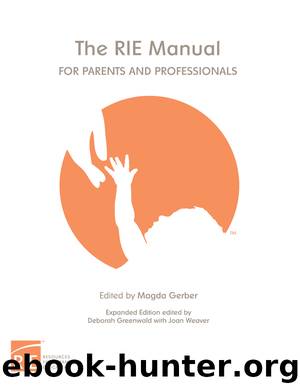The RIE Manual for Parents and Professionals Expanded Edition by Magda Gerber

Author:Magda Gerber
Language: eng
Format: epub
THE IMPORTANCE OF PERSON-ORIENTED ADULT-CHILD RELATIONSHIPS AND BASIC CONDITIONS THERETO
Judit Falk, MD
In one of her studies, Margaret Mead relates an experience regarding the reactions of the same audiences to which the Spitz [(1955)], Appell and Aubry [(1951)], and Robertson [(1952)] films were shown in succession [(Mead, 1962)]. The reactions elicited by the first two films were different from those triggered by the third. The Spitz and Appell and Aubry films show the behavior of institutional children who suffered grave hospitalism, whereas the Robertson film deals with the reactions of a child aged two years, transferred suddenly from his home environment to a hospital for a few days. Mead states that the first two films are viewed with compassion and consternation, whereas the third film elicits a protest reaction, since what it shows âmay happen to our children too.â Mead adds we must always remember the very real difference that exists between professional, impersonal ethics, and ethics based on personal motivation. The former carries the message: âNo single child in the world must die, suffer or be damaged in his personality,â whereas the latter suggests: âMy own child must be spared, must be protectedâ [(1962, p. 48)].
We, too, have observed these two types of moral approaches. One can often witness how professionals working in the field of institutional education, such as physicians, trained or semi-trained medical personnel, teachers, or psychologists, take a different view of the state and development of institutional children. Different judgments are made about their needs and behavior than with regard to the children reared in their own family or in their surroundings.
In the last 50 years, countless studies and publications were written, bringing up more and increasingly accurate data relating to the hazards of threatening the physical and mental health of mother-deprived infants and young children reared in institutions. Just as many studies relate to the other side of the picture, stressing the importance of intimate and continuous relationship between mother and child during the process of growth, so that the child may grow into a healthy adult. These two lines, however, intersect but infrequently, both in the field of research and in practice.
As far as the children reared in residential nurseries are concerned, neither the discovery of hospitalism as such and of the underlying reasons, nor the results of the related psychological research, have improved their conditions.
Whereas the investigations, therapeutic experiences, and the conclusions drawn from these as regards education in the family have grown more and more sophisticated, the efforts directed at promoting the conditions and development of family-deprived, institutionally raised children have been less successful. Most of the pertinent investigations formulate erroneous conclusions, since the phenomenon itself is not interpreted by them adequately.
Most of the attempts at improvement were based on the assumption of scarcity of stimulation, these claiming that the children live monotonous lives, devoid of impressions and experiences, and have accordingly little opportunity to acquire notions. Some have tried to ease this situation by providing various visual and acoustic stimuli (as, for
Download
This site does not store any files on its server. We only index and link to content provided by other sites. Please contact the content providers to delete copyright contents if any and email us, we'll remove relevant links or contents immediately.
The Low-Pressure Guide to Parenting Your Preschooler by Tim Sanford(109)
Confessions of a Reluctant Caregiver by Ariel Gore(103)
HELP! My Child Hates School by Linaberger Mara;Atwater P. M. H.;Mercogliano Chris;(92)
Parenting 2.0 by Tricia Ferrara(91)
We Need to Talk--Tough Conversations With Your Kids by Richard Heyman(86)
Six Kids and a Pop-Up Camper by Sue Ong(74)
What Waits Ahead is Way Better... and Way Worse Than You Imagined by Rebecca Rine(72)
Is it Bedtime Yet? by Emily Writes(63)
Love in the Time of Contempt by Joanne Fedler(61)
